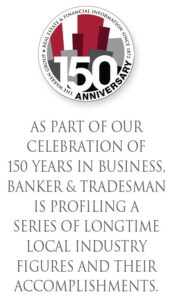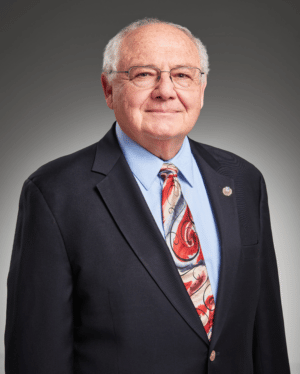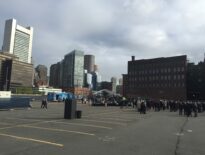David Wluka
Broker/owner, Wluka Real Estate
Age: 75
Industry experience: 46 years
David Wluka has been in the real estate business longer than many Realtors today have been alive. As a residential and commercial real estate agent for nearly half a century, the Sharon resident has played key roles in real estate development south of Boston, as an advocate on Beacon Hill for zoning reform, as a president of the Greater Boston Real Estate Board and statewide as a founding incorporator of MLS PIN.
Outside of real estate, he’s led successful efforts to build a memorial and restore the Jewish cemetery in his father’s hometown of Nowy Dwór, Poland, that Nazi forces destroyed during World War II, and help locals preserve the area’s Jewish heritage and promote religious tolerance. That relationship with the town of Nowy Dwór has now turned into private fundraising efforts to support the scores of Ukrainian refugee families the community took in following Russia’s invasion.
Q: You started out with a background in planning. How did that translate into a career helping people buy and sell real estate?
A: I started off as a planner and worked for a private firm in Boston. We did master plans, economic development studies. I worked on half of the Cape: I did Provincetown, Truro, Eastham, Falmouth and Mashpee.
What Nixon’s administration did was they went from local to regional planning, then they cut the funding in half. I was at Town Meeting in Guilford, New Hampshire that week with my slide presentation, because there was no PowerPoint in those days, and that week the [federal matching] money was gone. The matching money for phase two – writing the zoning bylaws, implementing the master plan – and you watched phase two slip away during the discussion on the floor of Town Meeting. Planning is ephemeral, you can’t touch it. Planning, or a fire truck? Planning or sidewalks? Planning or teachers? We had an office of seven planners. Within a year we were down to two because all the contracts went away. When the company sent back the water cooler, I thought it was time to look for a different job!
Basically, I spent the first seven or eight years of my career working for the towns, then I just crossed the street and started working for the other side. I found my background was different enough that I really had a niche, because I was used to talking to planning boards and zoning boards and I understood planning. I teach smart growth nationally now for [the National Association of Realtors]. I open up each of the sessions saying that each of you guys are really good at listing and selling and counseling, but unless you know how the house got there in the first place, you’re really missing something. Why is the house here and not there? Who made that decision?
Q: What would surprise today’s new real estate agents the most about how business was done back then? 
A: I tell you, when I first started, we didn’t have the kind of multiple listings service we have today. I remember as a newbie, the UPS truck would come with one four-and-a-half by eight-and-a-half of new listings for your towns, not every place. It was Sharon, Canton, Stoughton. That’s what you got. And then the new kid – and I was that for a while – had to make a mimeograph for all the other brokers. So that’s how it started. If you went out at an appointment you had to stop to make a phone call, either at a phone booth or at someone’s house. If you had the key and someone else needed it, they had to wait for you. It was a very different world.
The other thing that is really different is that most of the people from my generation came from someplace else. They were teachers, they were retirees, they were military. Most of them came from some other career, particularly because the barriers to entry in Massachusetts were very low. It took a big fight on the part of the industry to get the mandatory education requirements in. And we still have among the lowest regulations in the country. My philosophy has always been, we’re dealing with the most important thing in someone’s life – their home and all their money – so, professionalism is really important. The good agents make it, and the bad ones get filtered out, and a lot of the regulation has been to make sure that the bad ones don’t hurt people.
We’re dealing with the most important thing in someone’s life – their home and all their money – so, professionalism is really important.
Q: When you were president of the Greater Boston Real Estate Board, you forged an unlikely partnership that helped get the Community Preservation Act passed. How did that come about?
A: I didn’t forget it, I just happened to be the president that year – I won’t take all the credit! Our government affairs director and our lobbyist had been working for a decade to prevent transfer taxes, which was the original CPA proposal, and the argument now – and we’re fighting transfer taxes now – is, if you want to do something then everybody pays. Don’t put the burden on one little piece of the population. At the end of the day, when they saw we were able to rally enough support to stop them, and we put together this program where you make it a local option, if a town wants to charge everybody, that’s fine. If they don’t, they don’t. And there were matching funds that came with it, the carrot. So, I sat down with my counterpart at the Environmental League of Massachusetts that year, and we agreed that we both support the CPA in this form that could get passed. We did a joint op-ed in the Globe, and it passed soon after.
Q: You’ve been a big advocate for zoning reform, with NAR and locally. How do you rate Massachusetts’ most recent efforts: Housing Choice and the MBTA Communities legislation?
A: Actually, the Housing Choice piece goes back to the Patrick administration, I think. We used to meet once a week at the State House. It was the Realtors, the homebuilders, the nonprofits, the environmental people. We were trying to do zoning reform and every time we pushed it, the big pushback in those days was from Mass. Municipal [Association]. We were advocating for things that were normal in other parts of the country, like regional planning. Usually, towns tend to push the stuff they don’t like to the edge, near the other town, as opposed to where it ought to be. And we got major pushback to that.
At the end of the day, my perception was that it’s about power. That if you’re taking away power, people didn’t want to do that. Even the idea of switching from two-thirds to a simple majority, towns aren’t going to vote themselves less power. So, [Housing Choice] is a step forward – a major step forward – and it should have happened two decades ago. I’m watching Sharon zoning bylaws being changed following that. I’m watching developers come into some of the MBTA towns that have resisted that multifamily housing, so it’s opened the door.
Q: Outside of the real estate industry, you’ve also made it your life’s mission to restore a desecrated Jewish cemetery in your family’s ancestral hometown in Poland. The personal connection is palpable – your father survived the Nazi death camps – but it’s clear you’re aiming for this project to have a bigger impact on the world. What keeps you working at it?
A: My father was in Auschwitz for three years. I grew up with that group [of survivors]. Both of my parents were presidents of the New Americans Association of Greater Boston. My father was on the building committee for the Holocaust Memorial in Washington, D.C., my parents were both on the committee that created the Holocaust program at Brandeis University.
But it’s not just the Holocaust. It’s that it continues to happen. The fact of the matter is, when you look at what happened that precipitated the Holocaust, the U.S. didn’t get involved until Pearl Harbor. And here we are, Ukraine is being devastated and we’re still not doing what we should be doing. You’ve got a sovereign country being attacked by another sovereign country and [Russia’s] committing – clearly, it’s genocide. That makes me crazy.
I think my generation is lost to this. They’re not going to change. They’re not going to get involved. It’s the young people, it’s yours and the generation before you. My goal is to get the kids involved. I shared the Nowy Dwór with the incoming sociology class at BU annually before the pandemic. I always said at the end of the class, “I marched with Martin Luther King. I did the all-night teach-ins against the Vietnam War, I did this [repairing the cemetery at Nowy Dwór] and now it’s your turn. It’s your turn to do something and make a difference.”
Q: What’s next for you?
A: I’m 75, I’m doing stuff I’ve never done before. I’m working on three cannabis projects right now. I’m doing two solar farms right now. It’s fascinating stuff. There’s always something new to learn. And when something comes along that I don’t like, I have the luxury at this stage of my life to say, “I’m busy.”




 |
| 

